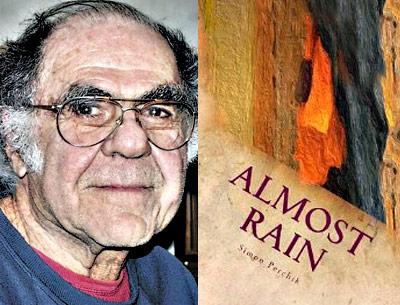Master of a Secret Art

“Almost Rain”
Simon Perchik
River Otter Press, $12.99
Anyone who observes the weather can see how nature transforms things into other things; rain turns dirt into mud. Similar processes have their effects on human lives, only we take them more personally; the seasons feel as if they correspond to our actual beginning and end. In the poetry of Simon Perchik, this elemental realm merges with individual consciousness, in careful and courageous language, to bring polymorphic awareness to life.
At first, “Almost Rain” seems to come out of nowhere. The poems are nonchalantly titled according to their first lines. The voice of the poet is immediate, familiar, and grasps for meaning without regard for the usual rhetorical distances. There is a vibrant sense of implied understanding in the work, exemplified by the recurring use of a second-person narrative style, an intimate address to you. These are not poems about a soul confessing itself to the world, rather, suggestions shared with the reader, about a mystery that happens in broad daylight, and the poignancy of an absent presence.
You return with the pieces
the way each rock
needs more time, a place
close, almost your breasts
still heating the Earth
that asks what day it is . . .
“You return with the pieces” begins the collection. It resonates with raw feeling and an almost brutal sensitivity to the erosions of time. Change is a palpable theme, and practically a character, in “Almost Rain.” Mr. Perchik deftly maneuvers his imagery to accommodate the rhythms of an invisible force, permeating existence, indifferently marking some things for obsolescence and others for regeneration.
There is a noticeable lack of subjective premises, which saves the poetry from being enveloped by obscure, abstract nothingness. Mr. Perchik unquestionably uses the real to describe what seems unreal.
You strap this watch in place
as though it inherited the wobble
that grew into sunlight
then darkness, then wear, then
you set the time years ahead
the way dirt unravels . . .
“You strap this watch in place” turns the physical world around so that its mystical side becomes more visible, showing how tangible experiences relate directly to the spiritual, as the magic of imagination returns us to childhood again. Mr. Perchik’s sense of play, his fascination with hard subjects, allows for some of the most pleasant surprises in “Almost Rain.” He writes like a master of some secret art, using words to indicate both the specificity of passion and the ultimate ambiguity of reason. Try as you might to put a finger on the text, the words shift shape, like simple questions with open-ended, metamorphic answers.
And yet these are poems that positively relate, and define themselves in the world, without fail. A glance to the back of the book shows that most if not all of the poems in “Almost Rain” were originally published in notable journals and reviews in the U.S., Canada, and the U.K. Add to that Mr. Perchik’s impressive résumé of published volumes over the past 50 (yes, 50) years, and we encounter what can seriously be called a prolific career.
“Almost Rain” is not just any new collection of verse, but perhaps the crowning achievement of an American poet, living in Springs, whose reputation and legacy will continue to spread.
As if for the last time you let go
the way the sun looks back in sadness
and circling down — without a sound
you make a pile from the discarded
and with the warmth in your hands
you stare at the sky without blinking . . .
I had the honor of reading poetry with Simon Perchik at the East Hampton Town Marine Museum a few summers ago. He was gracious and demure, to the point of having a good friend read his work to the large crowd in attendance. He sat and listened with the audience, an absent presence, enjoying the great beauty of his art.
Lucas Hunt’s most recent collection of poems is “Light on the Concrete.” The founder and director of Hunt & Light, a new poetry publisher, he lives in Springs.
